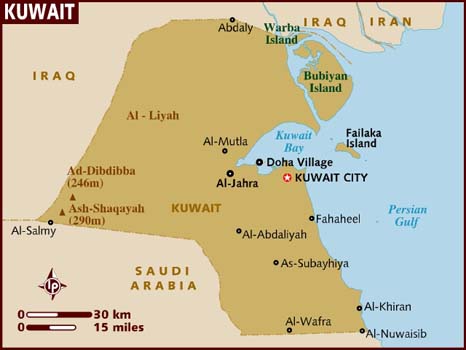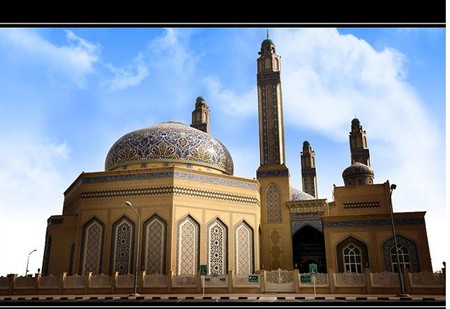Translating Arabic Speaking Countries: Kuwait
Kuwait is located northeast of Saudi Arabia and south of Iraq, and sits at the northern end of the Persian Gulf. At the beginning of the 18th century, the ‘Anizah tribe, who originated from central Arabia, founded Kuwait City, and in 1756, Kuwait became an autonomous sheikdom.
Kuwait’s first sheik was ‘Abd Rahim of the al-Sabah family and today, Kuwait remains a Constitutional Monarchy governed by the same al-Sabah family.
Between 1897 and 1961, fearing an occupation by the Turks, Kuwait sought protection from the British military. When Britain left in 1961, Iraq threatened to occupy the territory until the Arab League stepped in and ultimately recognized Kuwait’s independence. In August 1990, Iraqi invaded Kuwait but a coalition of Arab and Western military forces drove out Iraqi troops during the Persian Gulf War. As a result, Kuwait subscribes to a neutral policy among Arab States and often acts as a mediator, but also wants to establish dominance in the region.

Image Credit: Lonely Planet
Kuwaiti Demographics
- Population of 4 million (2016).
- A population growth rate of 1.7%.
- 2.4 million live in Kuwait City (capital city).
- More than 50% of the population are 25-54 years old.
- Median age is 30 years old.
- 98.3% of its population are considered urban
- 76.7% of Kuwaitis are Muslim and 17.3% are Christian
- The main ethnic groups are: Kuwaiti 31.3%, Arab (27.8%) and Asian (37.8%).
Kuwaiti Languages
- Arabic is the official language, but English is also widely spoken.
- Literacy among the total population is very high at 93.9%.
- Male literacy is 95% and female literacy is 91.8%.

Image Credit: Imam Baqir Mosque
Kuwaiti Culture
- Kuwait is known for its generosity and hospitality.
- Women and men who are not related are typically segregated.
- Kuwaitis greet each other with great affection, handshakes and kisses on both cheeks, questions about the well-being of family, one’s health, etc., but not between unrelated men and women.
- Kuwait has mosques in every city and town and the majority of people stop for prayer five times a day.
- Food plays a central role in Kuwaiti culture, but cannot be eaten in any Kuwaiti restaurant since the food is intended to be eaten only in homes.
- Arabic coffee is particularly important when having visitors in Kuwait.
- The consumption and sale of alcohol is completely outlawed.
- For fun, Kuwaitis go to the beach for water sports, the desert for camping and hunting, and the mall for family fun, meals and movies.
- A unique staple and tradition of Kuwaiti culture is the Diwaniah, a gathering place in a house reserved for men where issues about life, sports and politics are openly and freely discussed.
Kuwaiti Consumers
- GDP per capita is 37,500 USD.
- 2.1 million Internet users (c. 74.2% of the population).
- 87% of Internet users are on social media networks.
- Internet use grew from 150,000 users in 2000 to almost 2 million in 2012.
- The telecom market is a contrast between a highly dynamic and competitive mobile sector and a highly regulated land-line sector.
- Households with televisions: 95.44%.
- State-owned Radio Kuwait broadcasts in Arabic and English.
- There are 1,107 cell phones per 1,000 people.
Kuwait’s Future
- Kuwait has the second highest GDP per capita in the GCC, surpassed only by Qatar, which makes it a very lucrative target in the Middle East.
- Kuwait has become very web savvy in the last five years and provides opportunities for online marketers and retailers.
- Lucrative online markets include: CDs, books, apparel, and luxury items.
- 3.8% of GDP goes to education.
- 2.7% of GDP goes to health.
- Petroleum products remain the main source of income for Kuwait’s economy.
- Listed as the 5th wealthiest country in the world, per capita, the Kuwait currency, the Dinar, is considered the highest valued currency in the world.
Summary
In 1930, it was discovered that Kuwait had oil and later confirmed to have 20% of the world’s known oil resources. This fact has made Kuwait the second-largest oil exporter in the world. The sheik receives 50% of the oil profits and he invests those into the welfare, education and modernization of Kuwait.
Due to its wealth, high disposable income, and relative political stability, Kuwait presents a great opportunity for global investors, traditional and online retailers, and mobile marketers. Its financial institutions are among the oldest and most defined in the Gulf region.
